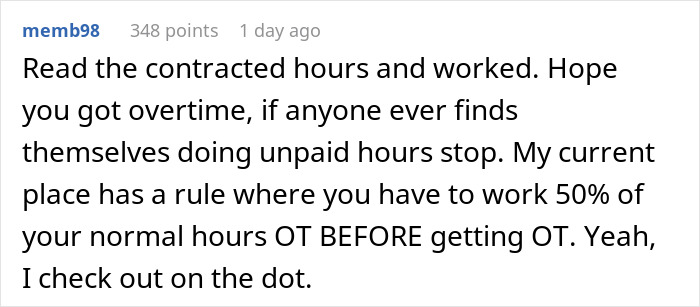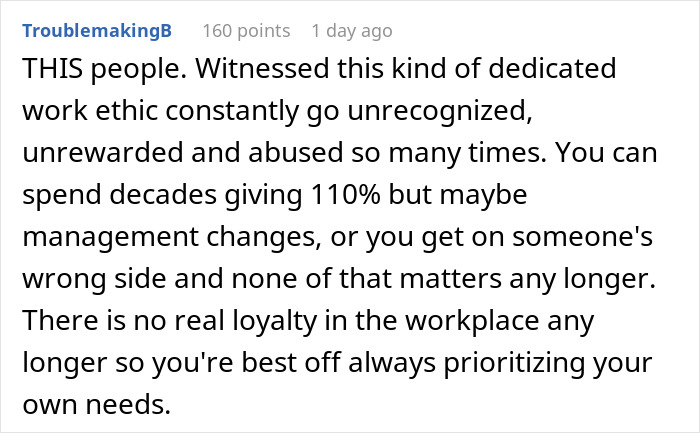There’s an infinite amount of career advice floating around the internet, and inevitably, some of it is contradictory. Dress for the job you want, not the job you have. But don’t try too hard, as your efforts won’t be appreciated anyway, and you’ll burn yourself out. We are able to pick and choose what we consider to be valid advice, but when it comes to direct demands from our bosses, we’re expected to follow them.
That’s why this web developer finally started to “act his wage.” Below, you’ll find the full story of how he maliciously complied with his employer’s request, as well as how they immediately regretted ever telling him to do so.
This web developer consistently worked overtime to ensure he was doing a great job for his employer

Image credits: olia danilevich (not the actual photo)
But after being told to “act his wage,” he decided that the extra effort wasn’t worth it

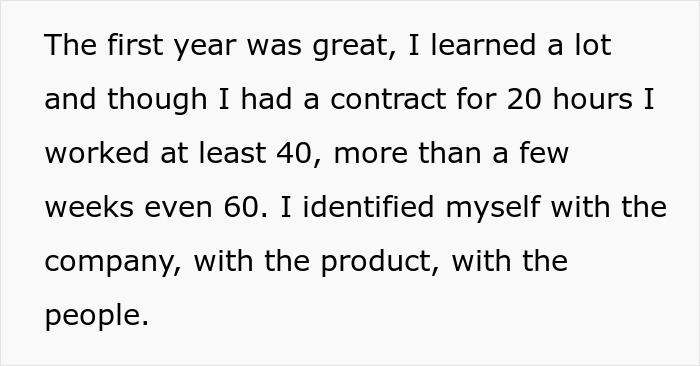

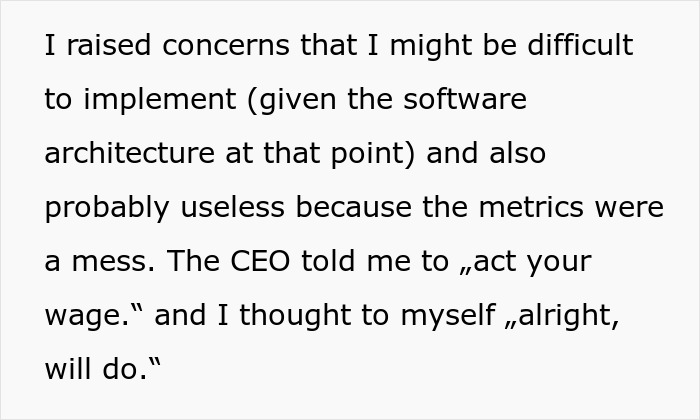
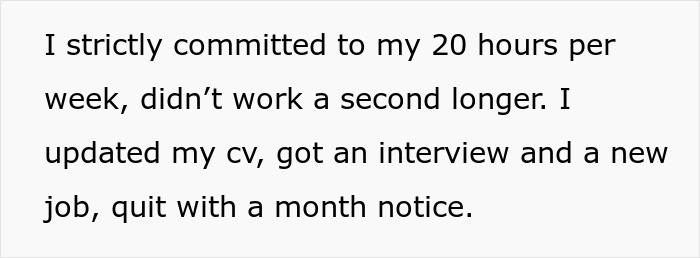
Image credits: SHVETS production (not the actual photo)
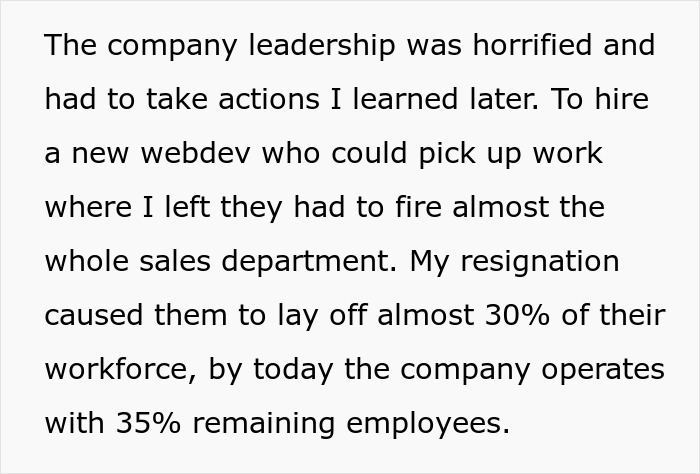
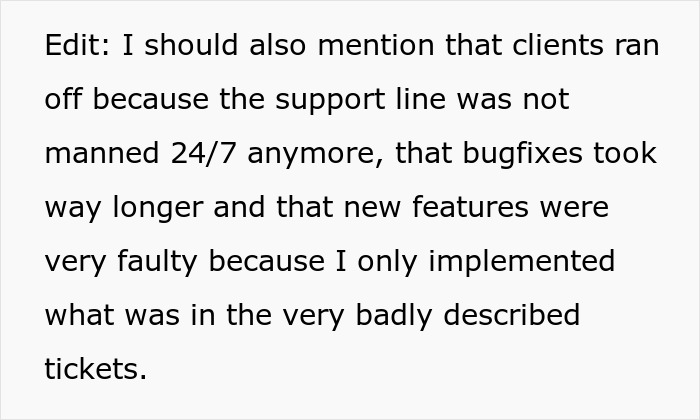
Image source: WebDev403
Later, the developer shared that they’re very happy with their new position
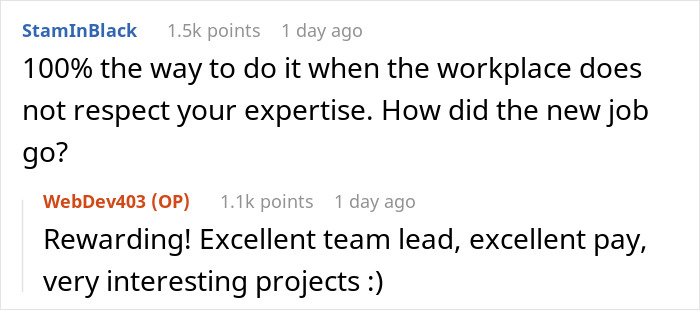
“It did not surprise me, because the company was caught too much in debating about hypothetical decisions rather than making actual decisions and driving the product forward”
To learn more about this situation, we reached out to the Reddit user who shared this post, Michael, and lucky for us, he was kind enough to have a chat with Bored Panda. First, we wanted to know what inspired him to tell this story now. “I am based in Germany and active in one or two work-related subs,” the OP shared. “Reading some of the frustrations there, I thought that it might be funny for an international audience to have a little laugh. Also I am still new to creating content, and this was something that passed through my head when I entered r/MaliciousCompliance, though it happened about three years back.”
Michael noted that he did not realize how large of an impact “working his wage” would have on the company. “I knew that operations would be hurt because the mean-time-to-recovery got extended at least four fold. What I did not know was that they would keep going on like that without covering,” he noted. “In the end, it did not surprise me, because the company was caught too much in debating about hypothetical decisions rather than making actual decisions and driving the product forward.”
The OP also believes that his previous employer regretted telling him to act his wage. “On a personal level? Yes. He got sent to an anger management training,” Michael shared. “On a company level? I guess so too, since they lost a software engineer that had a good understanding of the software and the field it is deployed in.”
He added that there wasn’t any chance he could have gotten a raise to keep him around, as he was told that the company was almost bankrupt. “But the good news (for me) is that the people that got laid off got new jobs very quickly,” the OP added.
“Take my story as a warning and lesson: Do not let others use you, do not let others blind you with fancy work stuff”
And luckily, Michael says he’s very happy with his new job. “[It] is very rewarding! I do not need to go the extra mile or above my wage because I am getting a salary,” he said with a smile. “On a serious note: The people at my new workplace are very intelligent, the management is very well organized, and [they] help me to grow in my role and above and beyond. It is mostly because my superiors are not bosses but leaders.”
The OP also added that, “The world of startups is shiny and new. It blinds people with its free food, cool laptops and everyone writing on windows (yes, actual windows). They make you feel at home, they make you feel important, that is how they trap you. You will work a lot, you will ignore legislative restrictions, you will drain your battery for that one ‘good job!’ compliment from your boss because you want to be seen.”
“The startup world has its glamour and definitely its right to exist, but keep this in mind: A lot of startups do not make it out of the incubation stage, and from there only a fraction of a few perform properly into real companies. These unicorns are rare, and chances are, that you work in a startup where this will not happen,” the OP explained.
“Take my story as a warning and lesson: Do not let others use you, do not let others blind you with fancy work stuff. Be enthusiastic, be bold, be hardworking, but also be aware of your surroundings, be aware of your mental health and be aware your loved ones. No work is worth the loss of any of it,” Michael says.
“Acting their wage” has become a popular way for employees to set boundaries in the workplace
According to Hive, acting your wage is similar to quiet quitting, as it allows employees to establish boundaries with their employers while making sure that they don’t work any more (or any less) than they’re required to. And author Wendy Syfret told Refinery 29 that this buzzword is essentially just a “repackaging of workers’ rights.”
Somewhere along the line, bosses got it in their heads that workers should be expected to go above and beyond, stay late whenever necessary and do more than what’s required of them without expecting a raise in return. But Syfret says that “following your job description shouldn’t be considered the bare minimum.” Deciding to act your wage guarantees that you won’t be exploited, and it can be empowering for workers to set boundaries.
But of course, not everyone is a fan of the “acting your wage” trend. Jack Kelly warns that this can be dangerous for your career in the long run. “You may temporarily feel good when you say ‘no’ to the boss and assert your autonomy of not being forced into working long hours without any appreciation or extra compensation,” Kelly writes for Forbes. “After a while, this attitude can become entrenched. It’s an ‘us against them’ mentality. Workers will spend more time extricating themselves from working than the actual work.”
Two thirds of employees believe that they’re not being compensated fairly
It’s also possible to transform “acting your wage” into a positive for companies, if they would simply be willing to pay higher salaries. If employees are satisfied with what they’re earning, they will likely work harder to ensure that they don’t lose their paychecks. According to CNBC, only 32% of workers in the US actually believe they’re being paid fairly, so it’s not surprising many bosses see “acting your wage” as a bad thing.
But investing in great employees can be beneficial for everyone. They’ll be happier earning more, and they’ll be less likely to leave, meaning that companies can increase their retention as well. “An employer should communicate that they’re willing to invest in employees’ career progression,‘” HR expert Mary Rizzuti told CNBC. “It’s nurturing and what we call ‘internal recruiting.’ Employers should have this holistic plan, and invest in employees to move their career along.”
We would love to hear your thoughts on this situation in the comments below, pandas. Do you think this employee made the right move by deciding to act their wage? Feel free to share, and then if you’re interested in reading another Bored Panda article featuring malicious compliance in the workplace, look no further than right here!
Readers applauded the man for his malicious compliance and called out his former employer for shooting themselves in the foot
